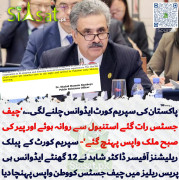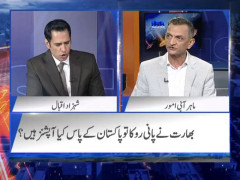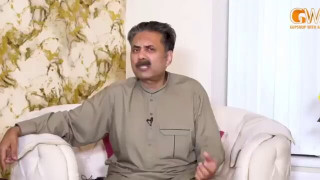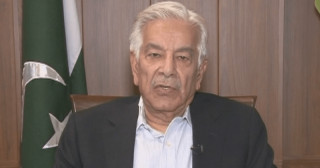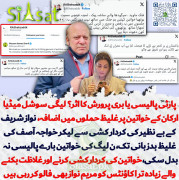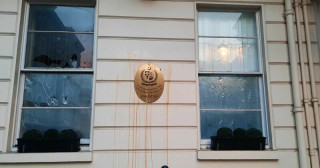Night_Hawk
Siasat.pk - Blogger
A son in search of his father
By: A Correspondent Date: 2011-01-06 Place: Mumbai
Aatish Taseer, son of assassinated Punjab Pakistan Governor Salman Taseer and Indian mother Tavleen Singh always had an uneasy relationship with his estranged father. His debut book, stranger to history was a journey that meshed the political with the personal
Salman Taseer, assassinated governor of Punjab province in Pakistan killed because of his liberal views on the blasphemy laws in that country had a connection with India.

Aatish Taseer, author and son of Indian journalist Tavleen Singh and Pakistani politician Salman Taseer
Salman Taseer's son Aatish Taseer, based in London and Delhi surfaced some years ago, with a book in search of his father. Aatish was born after his journalist mother Tavleen Singh had an affair with Salman Taseer though the relationship eventually ended.
Aatish's debut book, Stranger to History: A Son's Journey Through Islamic Lands holds several threads together, his relationship with his father and the complications of Indian-Pakistan parentage, the weight of history bearing down on those ties and the reaffirmation of the oft touted phrase: the personal is the political.
Affair
Aatish writes in a chapter called, 'Bhutto's Footprint.' "My parents met in March 1980, in Delhi. My father was in India promoting a biography he had written of his political mentor, the Pakistani leader Zulfikar Ali Bhutto. My mother, a young journalist with a Delhi newspaper, was sent to interview him.
'Which one of you is Salman Taseer?' she said, as she entered the room my father and his publisher were staying in at the Oberoi Hotel in Delhi.
Their affair began that evening. My father took my mother's number, they had dinner at a Chinese restaurant called the House of Ming, and for a little over a week, my father disappeared with my mother.
My parents met at a point in their lives when they became politically involved in countries that were experiencing political cataclysm...
My parents' affair lasted little more than a week, when my father left Delhi for Lahore, where he already had a wife and three small children. A month later, my mother discovered she was pregnant. The scandal of it was too great to assess.
My mother was from an old Sikh family, still carrying the pain of Partition. For her then, to become pregnant out of marriage by a visiting Pakistani was at the time, and still today, incalculable scandal. In a week when she was considering an abortion, my father called unexpectedly from the Club Marbella in Dubai. She told him what had happened...
My father asked what could be done to change her mind. She replied that they would have to at least pretend to be married, and over the course of their conversation, they came to a tenuous agreement to continue their relationship for as long as they could.
The months that followed were defined by secrecy. My parents met again in April, in Pakistan; they went to Dubai; they spent a summer in London, full of bright evenings and the bustle of people in pubs and open-air restaurants; and all the time, their relationship and my mother's pregnancy were kept from her parents and from my father's family in Pakistan.
It was this pact of secrecy that made their relationship possible, and it was from this period that one of the two objects I linked with my father as I grew up came into my mother's possession: a copy of his biography of Bhutto.
The inscription dated '17/5/80', read: 'With love and love, Salman Taseer.' The other was a browning silver frame with two pictures of him. In one he's holding me as a baby and in the other he's at a Mughal monument, dressed in white, wearing large seventies sunglasses."
Secrecy
Aatish even writes in a chapter called, 'Rupture' that, "A pact of secrecy had made my parents' relationship possible, but soon after they went to Dubai, leaving me with my grandparents in Delhi, this pact began to unravel. News of my birth was travelling. In Dubai, there was a false alarm.
My father was cooking dinner when his sister's husband walked up to him and said, 'How's Aatish?' My father dropped the pan he was holding and recovered himself only when he realised that his brother-in-law didn't in fact know of my existence, but was using my name not normally used to mean 'fire' in a banal sense to check the stove's fire.
Our past sometimes comes back to haunt us and so do the words we write. Aatish was with his father when Benazir Bhutto was killed in Pakistan. It is now eerie to read what he writes in the book about that murder. Aatish writes, "It's too awful,' my mother wept. I first saw her when I was with your father.
We were in Islamabad and he said, That's Benazir Butto. She was so young, so pretty. She had no business dying. Whatever her faults she didn't deserve to die like this. My mother had witnessed the death of the great Indian demagogues, Indira Gandhi and her son, Rajiv.
She understood demagoguery. She knew that in countries like ours, more so in Pakistan, where institutions are weak, where the state is threatened, these seemingly indestructible icons thrown up by the people bring a kind of solidity to the political landscape: they make it impossible to imagine the world without them..."
Aatish is Indian, his father Pakistani it is a cleave that only children from these relationships understand is so deep that to fill that chasm, even given all those clich s like love conquers all may be impossible.
In the book Aatish writes, "I didn't need to be Pakistani to understand what my father meant, only perhaps the degree to which he meant it. The death of the demagogue would demoralise the population. But in a country with few national leaders, removing Benazir made the very idea of the federation less viable..."
Aatish says in the book as he watched his father post Benazir's murder. "I felt a great sympathy as I watched the man I had judged so harshly, for not facing his past when it came to me, muse in the pain of history in this country. And maybe this was all that the gods had wished me to see, the grimace on my father's face, and for us, both in our own ways strangers to history, to be together on the night that Benazir Bhutto was killed."
Aatish's royal girlfriend
Aatish Taseer, 30-year-old son of the slain Pakistani politician Salman Taseer, went out for three years with a member of the British royal family but hopes they would marry were dashed four years ago.
Aatish, Salman's son from a brief relationship with the Indian journalist Tavleen Singh, upset his father by writing an autobiographical novel, Stranger to History: A Son's Journey through Islamic Lands. Reviewers said the book reflected the anguish of a son who felt betrayed by his father for abandoning his pregnant mother.
In 2006, Hello! magazine reported that the romance between Lady Gabriella Windsor, the daughter of Prince and Princess Michael of Kent, and Aatish Taseer, which many had expected to culminate in wedding bells, had ended after the royal beauty reluctantly decided not to follow her boyfriend back to his home in India.
Somewhat unusually a spokesman for Princess Michael went on the record to state, "I can confirm that Gabriella and Aatish are no longer together, but the love and respect they share for each other has not diminished."
He emphasised, "They are not getting married. That's official. They are very young, they are just enjoying each other's company."
Some sources suggested that Princess Michael, by birth a German, did not want her daughter to marry an Indian but there was no evidence to back up this claim.
The couple, who are both writers, first met when Gabriella (known as "Ella" in short) was on a magazine internship in the US while completing her final year at the prestigious Brown University, Rhode Island. When she returned to London, Aatish followed and the couple became a regular sight on the British social scene.
"Aatish very much wanted her to go back with him to India," a close friend told the Daily Mail, "but she wants to stay in Britain and pursue her writing career here. So they have very sadly decided to go their separate ways."
Rumours that the couple were about to get engaged were given currency in 2005 by a report in the "Mandrake" gossip column of the Sunday Telegraph, which stated, "Prince and Princess Michael of Kent will announce that their elegant 23-year-old daughter is to marry Aatish early this year."
The paper quoted Aatish, a trainee reporter then with Time magazine, as saying, "I will be heading back to India to pursue my career.
The opportunities in media out there are excellent and I'm determined to give it a go. I've lived here in London and in New York, but Delhi is where I am from and where I want to be."
However, in an interview to a reputable German Sunday newspaper, Welt am Sonntag, Princess Michael categorically denied her daughter was about to get married.
"It is not true," she said. "Gabriella is so young and is not thinking about getting married. She is going first to Africa to write an article about guenons (monkeys) in the Kalahari. Why should she be sitting around in India with babies? I am very fond of her boyfriend. I would not be against a marriage even though I receive letters from many people who do not appreciate multicultural marriages."

People pay homage to Pakistan's former Prime Minister Benazir Bhutto who was assassinated in 2007
It would have been hard for Aatish to have adjusted to his wife's royal background. But the reality is that she is royal only in a technical sense, being 31st in line to the throne. Her elder brother, Lord Frederick Windsor, 31, who was educated at Eton and Magdalen College, Oxford, where he took a 2:1 in classics, is 30th in line.
Meanwhile, Salman Taseer's brutal death may free his author son, Aatish, from writing about the father with whom he had, by his own admission, a difficult relationship.
While in the West it is all too common for children to write about celebrity parents in an excessively critical way, Pakistani and Indian society appears not to be ready for such public scrutiny. When Aatish wrote about the father-son encounter in the form of a thinly disguised novel, his father was not pleased.
Salman Taseer, who was on his third marriage and had other children, had ambitions and reacted badly, it seems, to his son's novel.
Some open-minded fathers might have congratulated their sons on the literary merit and honesty of such books. From all account and particularly that of Aatish, Salman Taseer was apparently furious. The son felt rebuffed.
Aatish wrote in the London Evening Standard about his father's opposition to his novel. "My first intimation of trouble was when my father, in part the subject of my memoir Stranger to History, re-entered Pakistani politics after a 15-year hiatus.
As the book was being typeset, he was sworn in as a caretaker minister in General Musharraf's Cabinet and then, with an ideological flexibility particular to Pakistan, he was Asif Ali Zardari's governor in Punjab."
Aatish continued, "As the book was going to print, he threatened to sue my Canadian publisher for referring to his union with my mother as 'a marriage'.
They were never married. They had a liaison soon after my mother, a journalist at the time, interviewed my father about his book on his political mentor, Zulfikar Ali Bhutto; I was the result. 'How funny, darling,' a friend said. 'Your father considers it libellous to have been married to your mother!' "
Several women journalists become involved with men they interview. Some in London dine out for years afterwards on the strength of the men who loved them and left them. But perhaps Aatish was being na ve if he thought his father's political opponents would not throw the book at him.
"I must sadly confess, after my father's political opponents in Pakistan used the book to rubbish his Islamic credentials, to being an accidental accessory to attempted political parricide," Aatish recounted. "My father's reaction was silence, far more menacing than his threats to the Canadians for their delayed attempt at making an honest woman out of my mother."
Fatima Bhutto has written a gripping book about her father's assassination. Painful though it will be, Aatish will now in theory also be able to write a moving book, both as an observer and a participant, about the latest shocking drama in Pakistan.
http://www.mid-day.com/news/2011/ja...-Salman-Taseer-Tavleen-Singh-relationship.htm
By: A Correspondent Date: 2011-01-06 Place: Mumbai
Aatish Taseer, son of assassinated Punjab Pakistan Governor Salman Taseer and Indian mother Tavleen Singh always had an uneasy relationship with his estranged father. His debut book, stranger to history was a journey that meshed the political with the personal
Salman Taseer, assassinated governor of Punjab province in Pakistan killed because of his liberal views on the blasphemy laws in that country had a connection with India.

Aatish Taseer, author and son of Indian journalist Tavleen Singh and Pakistani politician Salman Taseer
Salman Taseer's son Aatish Taseer, based in London and Delhi surfaced some years ago, with a book in search of his father. Aatish was born after his journalist mother Tavleen Singh had an affair with Salman Taseer though the relationship eventually ended.
Aatish's debut book, Stranger to History: A Son's Journey Through Islamic Lands holds several threads together, his relationship with his father and the complications of Indian-Pakistan parentage, the weight of history bearing down on those ties and the reaffirmation of the oft touted phrase: the personal is the political.
Affair
Aatish writes in a chapter called, 'Bhutto's Footprint.' "My parents met in March 1980, in Delhi. My father was in India promoting a biography he had written of his political mentor, the Pakistani leader Zulfikar Ali Bhutto. My mother, a young journalist with a Delhi newspaper, was sent to interview him.
'Which one of you is Salman Taseer?' she said, as she entered the room my father and his publisher were staying in at the Oberoi Hotel in Delhi.
Their affair began that evening. My father took my mother's number, they had dinner at a Chinese restaurant called the House of Ming, and for a little over a week, my father disappeared with my mother.
My parents met at a point in their lives when they became politically involved in countries that were experiencing political cataclysm...
My parents' affair lasted little more than a week, when my father left Delhi for Lahore, where he already had a wife and three small children. A month later, my mother discovered she was pregnant. The scandal of it was too great to assess.
My mother was from an old Sikh family, still carrying the pain of Partition. For her then, to become pregnant out of marriage by a visiting Pakistani was at the time, and still today, incalculable scandal. In a week when she was considering an abortion, my father called unexpectedly from the Club Marbella in Dubai. She told him what had happened...
My father asked what could be done to change her mind. She replied that they would have to at least pretend to be married, and over the course of their conversation, they came to a tenuous agreement to continue their relationship for as long as they could.
The months that followed were defined by secrecy. My parents met again in April, in Pakistan; they went to Dubai; they spent a summer in London, full of bright evenings and the bustle of people in pubs and open-air restaurants; and all the time, their relationship and my mother's pregnancy were kept from her parents and from my father's family in Pakistan.
It was this pact of secrecy that made their relationship possible, and it was from this period that one of the two objects I linked with my father as I grew up came into my mother's possession: a copy of his biography of Bhutto.
The inscription dated '17/5/80', read: 'With love and love, Salman Taseer.' The other was a browning silver frame with two pictures of him. In one he's holding me as a baby and in the other he's at a Mughal monument, dressed in white, wearing large seventies sunglasses."
Secrecy
Aatish even writes in a chapter called, 'Rupture' that, "A pact of secrecy had made my parents' relationship possible, but soon after they went to Dubai, leaving me with my grandparents in Delhi, this pact began to unravel. News of my birth was travelling. In Dubai, there was a false alarm.
My father was cooking dinner when his sister's husband walked up to him and said, 'How's Aatish?' My father dropped the pan he was holding and recovered himself only when he realised that his brother-in-law didn't in fact know of my existence, but was using my name not normally used to mean 'fire' in a banal sense to check the stove's fire.
Our past sometimes comes back to haunt us and so do the words we write. Aatish was with his father when Benazir Bhutto was killed in Pakistan. It is now eerie to read what he writes in the book about that murder. Aatish writes, "It's too awful,' my mother wept. I first saw her when I was with your father.
We were in Islamabad and he said, That's Benazir Butto. She was so young, so pretty. She had no business dying. Whatever her faults she didn't deserve to die like this. My mother had witnessed the death of the great Indian demagogues, Indira Gandhi and her son, Rajiv.
She understood demagoguery. She knew that in countries like ours, more so in Pakistan, where institutions are weak, where the state is threatened, these seemingly indestructible icons thrown up by the people bring a kind of solidity to the political landscape: they make it impossible to imagine the world without them..."
Aatish is Indian, his father Pakistani it is a cleave that only children from these relationships understand is so deep that to fill that chasm, even given all those clich s like love conquers all may be impossible.
In the book Aatish writes, "I didn't need to be Pakistani to understand what my father meant, only perhaps the degree to which he meant it. The death of the demagogue would demoralise the population. But in a country with few national leaders, removing Benazir made the very idea of the federation less viable..."
Aatish says in the book as he watched his father post Benazir's murder. "I felt a great sympathy as I watched the man I had judged so harshly, for not facing his past when it came to me, muse in the pain of history in this country. And maybe this was all that the gods had wished me to see, the grimace on my father's face, and for us, both in our own ways strangers to history, to be together on the night that Benazir Bhutto was killed."
Aatish's royal girlfriend
Aatish Taseer, 30-year-old son of the slain Pakistani politician Salman Taseer, went out for three years with a member of the British royal family but hopes they would marry were dashed four years ago.
Aatish, Salman's son from a brief relationship with the Indian journalist Tavleen Singh, upset his father by writing an autobiographical novel, Stranger to History: A Son's Journey through Islamic Lands. Reviewers said the book reflected the anguish of a son who felt betrayed by his father for abandoning his pregnant mother.
In 2006, Hello! magazine reported that the romance between Lady Gabriella Windsor, the daughter of Prince and Princess Michael of Kent, and Aatish Taseer, which many had expected to culminate in wedding bells, had ended after the royal beauty reluctantly decided not to follow her boyfriend back to his home in India.
Somewhat unusually a spokesman for Princess Michael went on the record to state, "I can confirm that Gabriella and Aatish are no longer together, but the love and respect they share for each other has not diminished."
He emphasised, "They are not getting married. That's official. They are very young, they are just enjoying each other's company."
Some sources suggested that Princess Michael, by birth a German, did not want her daughter to marry an Indian but there was no evidence to back up this claim.
The couple, who are both writers, first met when Gabriella (known as "Ella" in short) was on a magazine internship in the US while completing her final year at the prestigious Brown University, Rhode Island. When she returned to London, Aatish followed and the couple became a regular sight on the British social scene.
"Aatish very much wanted her to go back with him to India," a close friend told the Daily Mail, "but she wants to stay in Britain and pursue her writing career here. So they have very sadly decided to go their separate ways."
Rumours that the couple were about to get engaged were given currency in 2005 by a report in the "Mandrake" gossip column of the Sunday Telegraph, which stated, "Prince and Princess Michael of Kent will announce that their elegant 23-year-old daughter is to marry Aatish early this year."
The paper quoted Aatish, a trainee reporter then with Time magazine, as saying, "I will be heading back to India to pursue my career.
The opportunities in media out there are excellent and I'm determined to give it a go. I've lived here in London and in New York, but Delhi is where I am from and where I want to be."
However, in an interview to a reputable German Sunday newspaper, Welt am Sonntag, Princess Michael categorically denied her daughter was about to get married.
"It is not true," she said. "Gabriella is so young and is not thinking about getting married. She is going first to Africa to write an article about guenons (monkeys) in the Kalahari. Why should she be sitting around in India with babies? I am very fond of her boyfriend. I would not be against a marriage even though I receive letters from many people who do not appreciate multicultural marriages."

People pay homage to Pakistan's former Prime Minister Benazir Bhutto who was assassinated in 2007
It would have been hard for Aatish to have adjusted to his wife's royal background. But the reality is that she is royal only in a technical sense, being 31st in line to the throne. Her elder brother, Lord Frederick Windsor, 31, who was educated at Eton and Magdalen College, Oxford, where he took a 2:1 in classics, is 30th in line.
Meanwhile, Salman Taseer's brutal death may free his author son, Aatish, from writing about the father with whom he had, by his own admission, a difficult relationship.
While in the West it is all too common for children to write about celebrity parents in an excessively critical way, Pakistani and Indian society appears not to be ready for such public scrutiny. When Aatish wrote about the father-son encounter in the form of a thinly disguised novel, his father was not pleased.
Salman Taseer, who was on his third marriage and had other children, had ambitions and reacted badly, it seems, to his son's novel.
Some open-minded fathers might have congratulated their sons on the literary merit and honesty of such books. From all account and particularly that of Aatish, Salman Taseer was apparently furious. The son felt rebuffed.
Aatish wrote in the London Evening Standard about his father's opposition to his novel. "My first intimation of trouble was when my father, in part the subject of my memoir Stranger to History, re-entered Pakistani politics after a 15-year hiatus.
As the book was being typeset, he was sworn in as a caretaker minister in General Musharraf's Cabinet and then, with an ideological flexibility particular to Pakistan, he was Asif Ali Zardari's governor in Punjab."
Aatish continued, "As the book was going to print, he threatened to sue my Canadian publisher for referring to his union with my mother as 'a marriage'.
They were never married. They had a liaison soon after my mother, a journalist at the time, interviewed my father about his book on his political mentor, Zulfikar Ali Bhutto; I was the result. 'How funny, darling,' a friend said. 'Your father considers it libellous to have been married to your mother!' "
Several women journalists become involved with men they interview. Some in London dine out for years afterwards on the strength of the men who loved them and left them. But perhaps Aatish was being na ve if he thought his father's political opponents would not throw the book at him.
"I must sadly confess, after my father's political opponents in Pakistan used the book to rubbish his Islamic credentials, to being an accidental accessory to attempted political parricide," Aatish recounted. "My father's reaction was silence, far more menacing than his threats to the Canadians for their delayed attempt at making an honest woman out of my mother."
Fatima Bhutto has written a gripping book about her father's assassination. Painful though it will be, Aatish will now in theory also be able to write a moving book, both as an observer and a participant, about the latest shocking drama in Pakistan.
http://www.mid-day.com/news/2011/ja...-Salman-Taseer-Tavleen-Singh-relationship.htm



